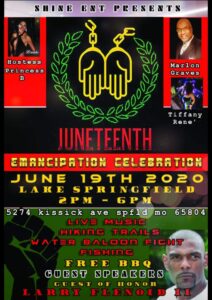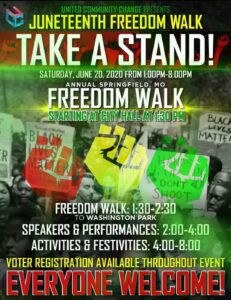Juneteenth is the oldest known celebration honoring the end of slavery in the United States.
On June 19, 1865, Union General Gordon Granger led thousands of federal troops to Galveston, Texas to announce that the Civil War had ended, and slaves had been freed. Approximately 250,000 Texan slaves had no idea that their freedom had been secured by the government.
However, the history of freedom in this country can be tangled, and this is no exception.
Here are nine facts about the historical moment, and what led up to it.
1. You may recall Abraham Lincoln’s Emancipation Proclamation from elementary social studies classes. In the condensed version, many learn that this executive order meant immediate freedom for slaves throughout the nation. However, since the country was in the midst of the Civil War, those states that had seceded from the Union did not adhere to the Proclamation, and slaves in those states remained unfree.
2. Though much of the language in the Emancipation Proclamation suggests otherwise, Lincoln’s primary objective was not to ameliorate the lives of those in bondage. Rather, his intent was preserving the Union.
In August 1862, Horace Greely, the editor of the New York Tribune, published an editorial addressed to Lincoln pressuring his stance on slavery and urging him to abolish it. Lincoln responded in an open letter to Greely, published in the Tribune that same August:
“My paramount object in this struggle is to save the Union and is not either to save or destroy Slavery,” Lincoln wrote. “What I do about Slavery and the colored race, I do because I believe it helps to save this Union…”
3. Lincoln and the Union army used slavery as a political motive to justify strengthened military endeavors against the Confederacy. Black soldiers were able to fight for the Union when Lincoln passed the Proclamation. Though they faced discrimination and often performed menial roles because of presumed incompetence, they increased the Union army in size.
4. The Civil War ended in April of 1865. In June of that year, General Gordon Granger and his troops traveled to Galveston, Texas to announce “General Orders No. 3” It stated: “The people of Texas are informed that, in accordance with a proclamation from the Executive of the United States, all slaves are free.
5. Throughout the war, Texas was not as closely monitored as other battle states. For this reason, many slave owners went to Texas with their slaves. With its relatively negligible Union presence, slavery continued there for much longer. After the Emancipation Proclamation went into effect, slaves in wartorn states often escaped behind Union lines or fought on its behalf.
6. The slaves who got the news were jubilant to hear of their freedom on Juneteenth. In the book, “Lone Star Pasts: Memory and History in Texas,” Felix Haywood, a former slave who gave a testimony about Juneteenth as part of a New Deal project recalled:
“The end of the war, it come jus’ like that—like you snap your fingers….Hallelujah broke out….Soldiers, all of a sudden, was everywhere—comin’ in bunches, crossin’, walkin’ and ridin’. Everyone was a-singin.’ We was all walkin’ on golden clouds….Everybody went wild…We was free. Just like that we was free.”
7. Freedom did not come at the “snap of a finger” for everyone in Texas. Some people who should’ve been freed continued to work through the harvest season because their masters withheld this announcement to reap more wages out of their slaves. This left many former slaves treated as though they were still in bondage.
In “Lone Star Pasts” Susan Merritt reported:
“Lots of Negroes were killed after freedom…bushwhacked, shot down while they were trying to get away. You could see lots of Negroes hanging from trees in Sabine bottom right after freedom.”
8. In the 1870s, a group former slaves pooled $800 together through local churches to purchase ten acres of land and create Emancipation Park to host future Juneteenth celebrations in modern-day Houston.
9. In 1980 “Emancipation Day In Texas” Became A Legal State Holiday In Recognition Of Juneteenth. However State Offices Do Not Completely Close, As It Is Considered A “Partial Staffing Holiday.” Elsewhere, The Holiday Is Also Referred To As Emancipation Day, Freedom Day, And Black Independence Day.
Many continue to celebrate Juneteenth 155 years later. Throughout the nation people host cookouts, parades, festivals, political awareness demonstrations, and other gatherings to commemorate.
Check out the events Springfield is hosting today and tomorrow.
There is also a virtual opportunity. The event is free and will be streamed on YouTube and facebook at 7 pm tonight: https://www.stepafrika.org/fundraising/?fbclid=IwAR36W1cFf1rpgS1Ha9uYxjx6xwhLCZMZNF_k1YfBFOgb4-jo38YkGKsDMTA


